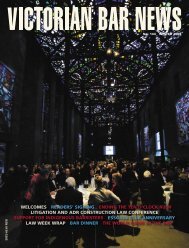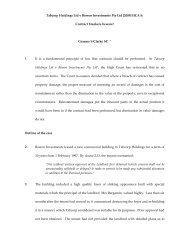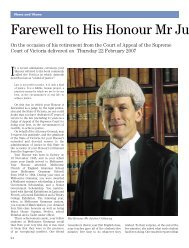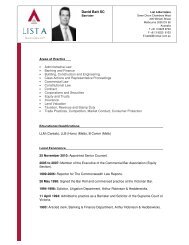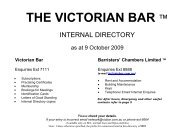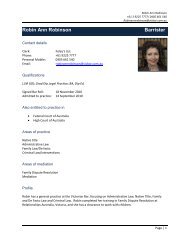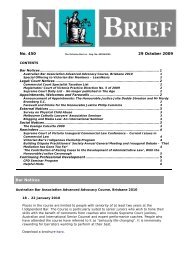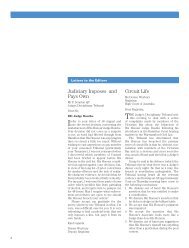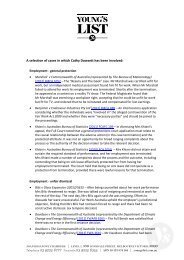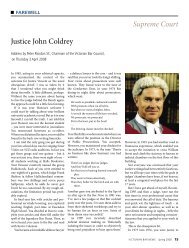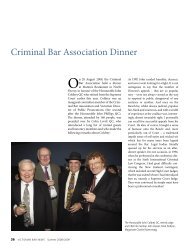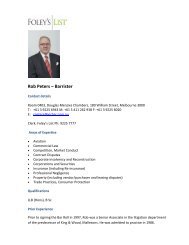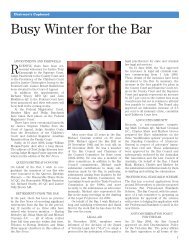Justice William Charles Crockett AO - Victorian Bar
Justice William Charles Crockett AO - Victorian Bar
Justice William Charles Crockett AO - Victorian Bar
- No tags were found...
Create successful ePaper yourself
Turn your PDF publications into a flip-book with our unique Google optimized e-Paper software.
any American men speaking up whenArnold Schwarzenegger chided his politicalenemies by calling them “economicgirlie-men”. 16 We need to persuade thosewho are sympathetic to women’s causes tospeak up when necessary.On a more serious note, this is alreadyhappening in the world outside the law,where attempts are being made to enlistmen who abhor violence in the causeof reducing violence against women.Saturday is Stop Violence against WomenDay. Its great to see more men this yearwearing white ribbons.If we are making alliances with men itmay also be useful to draw attention tothe areas in which men have benefitedbecause women have placed issues on theagenda. Men are likely to benefit if thereis greater flexibility in working hours; menmay also benefit from a culture whichencourages them to balance the joys ofwork with the joys of family life.Women should be reminding men thatwe are not seeking to pole vault over thembut to create an environment of equality,which benefits us all.ENCOURAGING LEADERSHIP.My third strategy focuses on the importanceof leadership in working towardsgender equality at the <strong>Bar</strong> and in thebroader community.Research done in the 1980s by ProfessorFay Gale shows that women are morelikely to succeed in universities in whichVice-Chancellor and senior Professors arecommitted to gender equality. 17 Similarfindings have been made in the corporateworld, where the support provided bysenior managers can change workplacedynamics and ensure that women’s talentsare recognised and developed. As a younglegal academic I was very grateful for thementoring and support provided to me bysome senior legal academics. Initially all ofthem were men, but as more women wereappointed to Chairs I also received somesupport from women.The <strong>Bar</strong>, of course, does not work likea university or a commercial entity. Itsstructures are more diffuse and individualised.Nevertheless there are both maleand female leaders at the <strong>Bar</strong> who arewidely respected and who have the capacityto provide leadership on gender issues.The <strong>Bar</strong> Council made an excellent startby commissioning its 1998 “Report onEquality of Opportunity For Women” atthe <strong>Bar</strong>. It needs to keep up that momentum.I note the presence here of both menand women who have given importantleadership in the area of gender equality.THE IMPORTANCE OF WOMENSUPPORTING WOMENI have already spoken of the important rolethat allies and peers can play in breakingdown gender stereotypes and encouragingindividuals to make the best of theirtalents. When women first moved intoareas which were previously monopolisedby men it was common for them to takeon masculine colouration. Unfortunatelythis sometimes made it difficult forthem to support their female colleagues,for fear of being seen as different or incapable.While this attitude was understandable,I hope it no longer exists. One ofthe purposes of the Women <strong>Bar</strong>risters’Association is to provide that support. Itis interesting, therefore, that I have heardsome women lawyers question the needfor a distinct organisation for women.In their view, we have now reached theposition where we can afford to be genderblind. I do not agree with that view. I congratulateand support the work done bythe Women <strong>Bar</strong>risters’ Association providingsupport for its members.In 1998 Neil Young (as he was then)Chairman of the <strong>Bar</strong> Council wrote tothe Steering Committee of the Projecton Equality of Opportunity for Women atthe <strong>Victorian</strong> <strong>Bar</strong>, to <strong>Justice</strong> <strong>Charles</strong>, whochaired that Committee, to thank us forour work. In the letter he said that:the research findings indicate that womengenerally find it more difficult to gain entryto, and support from, the mainstream ofthe <strong>Bar</strong>. This difficulty may have significanteffects for individuals in terms of recognition,work satisfaction and success.This was written by the then Chairmanof the <strong>Bar</strong> Council just over seven yearsago. Though things have improved forwomen barristers, there is still room forchange.I cannot conclude this speech withoutsaying a few words about the HonourableRosemary Balmford. Another speakerwill be talking about her career at somelength, but I would like to briefly paytribute to her achievements (I hope shedoes not mind me referring to her asRosemary). When I was at Melbourne LawSchool Rosemary had a reputation as anexcellent teacher.American research shows that womenjudicial officers often have differentcareer paths from male judges. Rosemarypractised as a solicitor and was a seniormember of the federal AAT, before shewas appointed to the Supreme Court.Her success helped to demonstrate thatpractice as a barrister is not an essentialrequirement for judicial appointment.It blazed a trail for many other womenwho have now become judicial officers.We should all be grateful for Rosemary’soutstanding example.Notes1. According to figures available on the <strong>Victorian</strong>Supreme Court website.2. According to figures available on theCounty Court website3. According to figures provided by the Magistrates’Court.4. According to figures available on the FederalMagistrates’ court website.5. According to the <strong>Victorian</strong> <strong>Bar</strong> website.6. According to the <strong>Victorian</strong> <strong>Bar</strong> website.7. This survey did not cover Victoria.8. Bendable or Expendable? Practices andattitudes towards work flexibility inVictoria’s biggest legal employers. LawInstitute of Victoria, 2006.9. Forty-five percent of in-house lawyerswere women, as opposed to 52 per cent ofprivate practice lawyers.10. Harpley, K, “Women in House”, LawyersWeekly 2006.11. Sexual Offences: Final Report, <strong>Victorian</strong>Law Reform Commission, August 2004, theimplementation of which led to a series ofreforms, including the amendments in theCrimes (Sexual Offences) Act 2006.12. Defences to Homicide: Final Report, <strong>Victorian</strong>Law Reform Commission, November2004, resulting in a number of legislativeamendments in the Crimes (Homicide)Act 2005.13. The Australian authority is R v L (1991)103 ALR 577. In England the rule was abolishedby R v R [1991] 2 WLR 1065.14. Henderson, K.D., Rogers, J.K. Genderand Society Vol 15, No 2 (April 2001) pp.218–238.15. “Gender and Sexuality in Discourses ofManagerial Control: The Case of WomenMiners” in Gender, Work and OrganizationVol 9, No 5, November 2002.16. Speech by California Gov. ArnoldSchwarzenegger Tuesday, August 31,2004, cited http://www.cnn.com/2004/ALLPOLITICS/08/31/gop.schwarzenegger.transcript/.17. This work was expanded upon at theUniversity of Western Australia. See forexample “Creating Opportunities: AnEvaluation Of The Leadership DevelopmentFor Women Programme 1994–1997”University of Western Australia, cited http://www.osds.uwa.edu.au/about/activities/ldw/successes/evaluation/opportunities/.67



